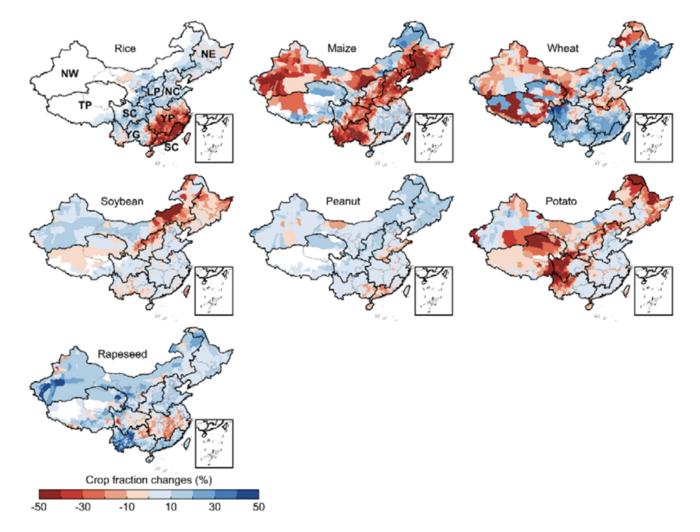A groundbreaking study in agricultural sustainability has emerged from leading researchers in China, offering vital insights into the need for adaptive changes in crop distributions amid escalating climate challenges. As global temperatures rise and weather patterns become increasingly erratic, the potential for optimizing crop planting strategies in China carries with it significant implications not just for the country but for global food security.
China’s agricultural practices have evolved dramatically since the 1980s, driven primarily by advancements in nutrient management and intensive irrigation systems. This transformation has led to a notable increase in food production, which has now reached nearly double the levels observed four decades ago. However, with forecasts indicating that food demand will continue to surge, the study led by Qi Guan and colleagues has sought to examine China’s agricultural framework through the lens of various climate change scenarios that could unfold in the 21st century.
Utilizing a sophisticated dynamic global vegetation model, the researchers crafted a series of tailored scenarios aimed at enhancing crop yields while simultaneously minimizing environmental repercussions, particularly nitrogen runoff and excessive water consumption. Such an approach is critically necessary as the adverse effects of climate change threaten to destabilize food production systems globally. Notably, the study accentuates the urgency of transitioning from traditional crop types to more sustainable alternatives in response to shifting climatic conditions.
The findings from the researchers are both encouraging and practical. The optimal crop distribution model they proposed indicated that adopting these alternative planting strategies could increase productivity by an impressive 14.1%. Furthermore, with targeted efforts to switch crops to more suitable varieties, the model projected an 8.2% reduction in nitrogen leaching—a vital environmental concern that can lead to severe ecological degradation. Water conservation efforts were equally promising, with a forecasted reduction in water use by 24.0%, a crucial factor in a country where water scarcity is an ongoing concern.
Looking specifically at geographical adjustments, the researchers concluded that warming temperatures and increased summer rainfall in Northern China might create new opportunities for rice cultivation, traditionally confined to more temperate or warmer climates. By shifting maize production away from arid regions, water resources could be conserved substantially, avoiding unnecessary depletion of this essential resource.
Drought-resistant varieties of wheat have shown potential for thriving in regions such as the Northeast China Plain, where climate impacts are felt most acutely. Meanwhile, alternative cash crops, such as soybeans, are thought to flourish in northern, northwestern, and the Yangtze Plain areas. Meanwhile, water-intensive crops like potatoes can be successfully relocated to eastern and southern provinces where climatic conditions are more favorable. Thus, the findings underscore the necessity of a strategic approach to crop rotation that could enable China to fortify its food supply chains while effectively managing resource use.
A key takeaway from this research is the feasibility of implementing coordinated efforts at a national level to facilitate crop switching in China. The optimal management of crop distributions stands to yield not only significant agricultural productivity but also extensive environmental benefits. In this light, the researchers advocate for a shift in agricultural policy towards sustainability, urging stakeholders to realign practices to match the anticipated climatic changes.
The implications of this research reach beyond China’s borders. A more sustainable agricultural strategy in one of the world’s largest food producers could catalyze similar reforms in other countries grappling with the realities of climate change. The burgeoning need for adaptable food production systems emphasizes how interconnected global agriculture has become and how necessary coordinated action is to ensure food security amidst the unpredictable climate landscape.
This study represents a vital intersection of science, policy, and environmental stewardship, highlighting the urgent need to rethink agriculture in terms of sustainability. The researchers’ emphasis on collaboration amongst agricultural scientists, policymakers, and farmers is crucial to formulating actionable solutions that marry productivity with environmental conscientiousness.
To ensure the adaptability of farming methodologies, the implementation of practices supported by technological advancements in agricultural sciences must be prioritized. Innovations in crop genetics, precision farming techniques, and data analytics can offer farmers the tools needed to make informed decisions in response to climate fluctuations. Fostering a culture of research-driven decision-making will play a vital role in a successful transition towards sustainable agriculture.
As the global community stands at the precipice of a climate crisis, studies such as this illuminate pathways to resilience in food systems. The imperative is clear: scientific research must inform policy and practice to safeguard the future of food production in face of ongoing environmental changes.
The discourse surrounding agricultural sustainability is not merely academic; it is fundamentally rooted in real-world applications that impact livelihoods, economies, and environments globally. The findings presented by Qi Guan and his team stand as a testament to the potential of research to catalyze transformative changes in how food is grown and managed, ensuring not only the survival but the prosperity of future generations.
In conclusion, addressing potential climate-induced agricultural challenges through innovative practices represents a pressing necessity. This body of research sets the stage for discourse, prompting further investigation and stimulating action across the agricultural sector. With concerted efforts, a reimagined, climate-responsive agricultural landscape in China could serve as a beacon for global food security and sustainability, echoing the call for proactive measures that resonate far beyond its borders.
Subject of Research: Agricultural sustainability and crop distribution optimization in China
Article Title: Improving future agricultural sustainability by optimizing crop distributions in China
News Publication Date: 7-Jan-2025
Web References: [Journal Website Link]
References: [Citations to other relevant studies and articles]
Image Credits: Credit: Guan et al.
Keywords: Climate change, Maize, Food production, Global food security





